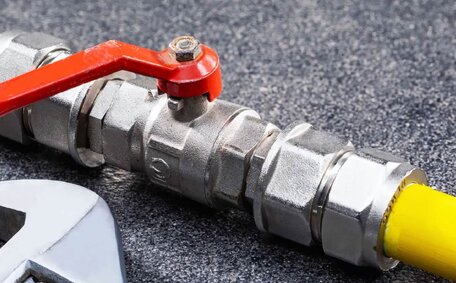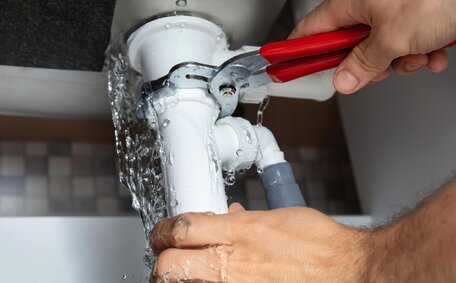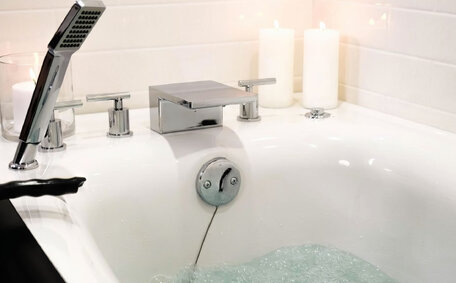Introduction to Hot Water Systems
Having a reliable hot water system in your home is essential for comfort and convenience. It ensures heated water is available for bathing, laundering, dishwashing, and other daily activities. The array of different hot water systems available can make selecting the ideal fit for your abode quite a puzzle.
This article breaks down the main types of water heaters, explaining their functions, pros and cons, cost-efficiency, and environmental impact to help you make an informed choice. Whether you’re constructing a new home or updating an existing one, our guide will help you choose the type of hot water system that’s tailored to your needs.
We cover popular systems including solar, heat pump, gas, and electric storage water heaters. You’ll finish with a clear understanding of key factors to consider when selecting a hot water system for your home.
Types of Hot Water Systems
Residences typically use one of these five main types of water systems:
- Boosted solar water heaters - Utilise solar energy harnessed by roof-mounted solar panels, with additional boosting when necessary to ensure warmth.
- Electric heat pump water systems - Harness heat from the air to warm water, boasting remarkable energy efficiency.
- Gas storage hot water systems - Combine gas and solar input to efficiently heat the water in a storage tank.
- Electric storage hot water - Heats water using electric heating elements in an insulated storage tank.
- Instantaneous hot water - On-demand systems that heat water as it flows through without needing a storage tank.
Each system has pros and cons in terms of cost, efficiency, fuel options, and environmental impact, which we will detail subsequently.
Storage Tank Water Heaters
A storage water heater, often referred to as a traditional water heater, has an insulated tank that heats and stores water. The water stored in the hot water tank is warmed by a heater system using either internal electric elements or a gas burner. Hot water systems heat the water beforehand and maintain it ready in storage for when you require it.
Gas electric storage systems, with installation costs between $1,500 and $2,500, offer savings on operational costs over the long term.
An electric hot water system, in comparison to gas models, tends to have lower upfront costs averaging $800 to $1,500 but might incur higher operational expenses.
A downside is that storage units take up more space than tankless systems due to the large tank. Maintenance is low, but anodes may need replacing every 4-5 years to prevent corrosion.
While they may lose some standby heat, modern tanks boast better insulation to help maintain hot water levels.
Storage water heaters are popular in homes due to their affordability and reliable performance. While they suit most home types, homes needing more hot water may prefer on-demand systems.
Instant or Continuous Flow Water Heaters
Continuous flow water heaters, aka tankless or on-demand systems, provide an endless supply of hot water without a storage tank. Instead, They utilise high-powered burners or heating elements that heat water as it flows through the system, ensuring your usage needs are met without delay.
This ensures a steady hot water supply, cutting down on standby energy losses and related costs. Tankless flow hot water systems offer an endless surge of warmth, ensuring you never run out of hot water, ideal for expansive homes.
Rather than needing a tank, these units provide efficient space heating and can be effortlessly mounted on walls. Nevertheless, these tankless water systems carry a steeper initial cost of $2000-$4000. Flow hot water systems’ rates may also limit simultaneous use in multiple bathrooms.
Instantaneous or continuous flow systems are well-suited to homes with high hot water usage or limited space. They’re energy and cost efficient in the long run but involve a greater initial investment.
Comparing the Main Hot Water System Types
System Type Upfront Cost Operating Cost Efficiency Suitability
| Solar Hot Water | $3000 - $6000 | Low | High | Eco-friendly option using renewable solar energy. Requires roof space for collectors. |
| Heat Pump | $2500 - $4000 | Low | Very High | Extremely energy efficient. Works well in temperate climates. |
| Gas Storage | $1500 - $2500 | Moderate | Moderate | Reliable performer. Low maintenance. Natural gas fuel source required. |
| Electric Storage | $800 - $1500 | High | Low | Most affordable option. Higher running costs. Easy to install. |
| Instantaneous | $2000 - $4000 | Low | High | Endless hot water. Compact size. Higher flow rates needed. |
The comparison underscores the distinctive features of each system, aiding you in selecting the one that fits your requirements best. Solar and systems use heat pump technology, being the most efficient with renewable energy, but they come with a higher initial cost.
Storage heaters are tried and tested performers, frequently recommended as a type of water heater suitable for many households.
Choosing the right water heater involves considering efficiency, costs, space, energy sources, and environmental impact.
Electric Hot Water Systems
Electric water heater systems utilise submerged heating elements within an insulated tank to warm water. An optimum hot water temperature is thermostatically maintained, ensuring cold water is heated effectively.
Electric water heaters come with storage capacities from 50 to 400+ litres. Smaller electric hot water heaters are ideal for 1-2 person households, while larger tanks accommodate bigger families more effectively. They can be installed anywhere with access to electricity, making them widely adaptable.
Electric systems can also have more expensive running costs due to grid electricity prices. Reducing thermostat temperatures and installing timers or utilising an off-peak electricity tariff can save considerable energy. Maintenance involves replacing heating elements and anodes over time.
Despite their reliability, electric heaters significantly contribute to greenhouse gas emissions via fossil fuel power generation. Eco-friendly solar or heat pump systems are more environmentally friendly alternatives.
Gas Hot Water Systems
Gas hot water systems utilise a specific fuel type - natural gas or LPG, seamlessly providing your gas hot water system needs by heating water efficiently. A gas burner heats the water inside the water tank, ensuring a consistent supply of hot water. This hot water is then available on demand.
Gas LPG systems guarantee a reliable hot water supply with lower operating costs compared to their electric counterparts. However, gas lines must be available for natural gas systems. LPG systems can work in remote areas using delivered gas bottles.
While storage tanks occupy space, gas water heaters have improved insulation to reduce standby heat losses. Condensing technology also captures waste heat, boosting efficiency. Lifespans typically reach 10-15 years.
On the downside, gas systems produce gas emissions from gas combustion. Condensing heaters minimise this impact by utilising exhaust gases. Ultimately heat pumps, solar power or biofuel systems are more environmentally sustainable.
Solar Hot Water Systems
A gas solar heat pump hot water system is a trailblazing option, running on solar power and gas, ensuring your household has steady access to warmed water. They harness solar water collectors, typically roof-mounted panels, to absorb the sun’s warmth. This process effectively captures solar energy to supply hot water through a heat exchanger in an insulated storage tank.
Benefits of solar hot water include:
- Lower energy bills - Solar replaces expensive grid electricity or gas
- Reduced carbon footprint - A green, sustainable choice producing zero emissions
- 30-50% of hot water free from the sun - Savings dependent on sunlight hours
- Technology Certificates (STCs) available - These government rebates significantly reduce the overall system costs
- Lifespan of 15-20+ years with low maintenance needs
A solar hot water supply does need full sun exposure on your roof without shading. Installation costs from $3000-$6000 are high but the system pays for itself within 5-10 years. Solar collectors last 15-30 years needing little upkeep.
Solar systems are an ideal eco-friendly choice for families, offering significant financial and environmental benefits.
Heat Pump Hot Water Systems
Heat pump water heaters are highly energy efficient, capitalising on ambient outdoor air heat. They work similarly to a refrigerator but in reverse, focusing captured warmth into the home’s water.
Compressor and fan coils extract low-grade heat from atmospheric air, even at cooler temperatures. This warmth is pumped into a heat exchanger storage tank that rapidly heats incoming water, keeping it at a preset temperature.
Benefits of solar heat pump systems include:
- Very high efficiency - Reduce energy bills by 65% or more
- Quiet, eco-friendly performance with minimal greenhouse emissions
- Work year-round, but best in temperate climates not severely freezing
- Lower peak demand on electricity infrastructure using off-peak ambient warmth
- Long lifespans of 15-20 years with very low maintenance
Heat pump systems are ideal for energy-conscious families focused on efficiency and sustainability. They require initial investments between $3000-$5000 but provide long-term savings on electricity costs in suitable climates.
Choosing the Right Hot Water System
Choosing the best hot water system for your residence from the various options available can be challenging. Carefully consider factors like:
- Daily hot water usage - Storage tanks suit low to moderate usage homes. Instant hot systems better match high demand households using over 125L+ per day.
- Household size - Larger 300L+ type water heaters or several instant units are suitable for big families. Smaller type water heaters suffice for 1-2 residences.
- Available energy sources - Solar and heat pumps rely on sunlight or air warmth. Electric/gas units need those utilities connected.
- Installation considerations - Space for tanks, collectors; wall mounts for compact units; gas, electricity, roof access issues.
- Upfront costs vs operating costs - Initial investments vs projected savings on energy bills over a system’s lifespan.
- Rebates and incentives - Government solar rebates, promotional deals from providers. Reduce overall costs.
Taking these factors into account will guide you to the appropriate hot water system for optimal performance and cost-effectiveness in your home.
If you’re uncertain, our professionals are ready to assist with your hot water service needs. We provide personalised recommendations to match you with which hot water system aligns best with your household’s distinctive needs.
Installation and Maintenance Considerations
It’s important that a hot water system is installed and maintained properly to ensure its long-term performance. While the upfront cost of a new hot water system can seem daunting, professional installation is highly recommended.
Our specialists strongly recommend hiring qualified plumbing services for hot water system installations, ensuring accuracy and safety. Improper installations can lead to leaks, burst pipes, gas leaks (for gas systems), and even void manufacturer warranties.
Just as important as professional installation is ongoing system maintenance. Most tanks, heaters and pump systems require anode rod replacements every 5 years, scaling and corrosion checks, leak inspections and more.
Poor maintenance can cut a water heater’s lifespan from 10-15 years to around 5 years. Regular checks and part replacements are crucial for optimising your system’s longevity.
For a worry-free experience with same day installation and maintenance of your water heater system on the Gold Coast, we highly recommend trusting our licensed plumbing experts. Our expert service includes managing paperwork, permits, and scheduling maintenance reminders for hassle-free upkeep. Contact us for reliable hot water systems that will consistently meet your needs - our team is known for excellent service and lasting customer satisfaction.






